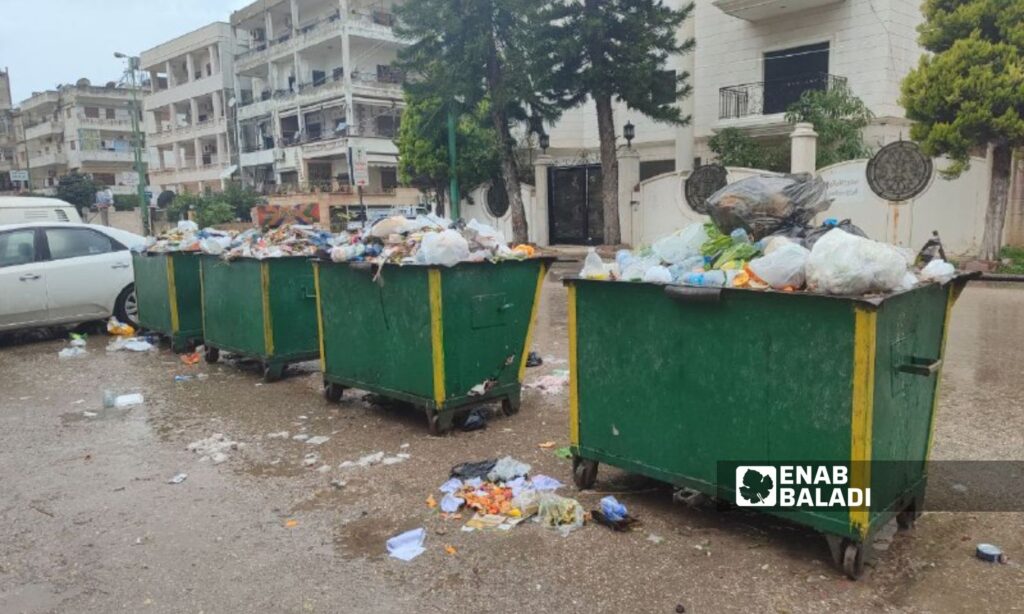Latakia – Linda Ali
Garbage overflows in the city of Latakia; containers in the middle of the streets and between houses are chock-full, while waterlogged potholes spread around, especially during the winter season, indicating the significant neglect the city is suffering from, despite being one of the most important tourist provinces in Syria.
Although neighborhoods such as al-Ziraa, the Seventh Project, and the city entrance near the Al-Wahda newspaper building and Tishreen University are considered the main neighborhoods where garbage used to be regularly removed, today this is no longer the case; garbage is spilling from the containers due to being left for several days without removal.
The garbage problem is troubling Huda (46 years old), who lives in the Seventh Project neighborhood. She said that the situation seems catastrophic in both summer and winter; during summer, rodents and insects spread and emit very foul odors, and in winter, the rainwater sweeps the garbage scattered around the container, turning the scene into a disaster.
“We asked for a solution and complained, but no one responded,” added the lady who often cannot open her house window in summer due to the foul smells.
Hassan (23 years old), a university student, mocked the prevalent garbage problem in his city and said, “Western sanctions might be the main reason for not removing the garbage regularly.” He added that citizens should immediately start a campaign on Facebook demanding the United Nations and the international community to intervene to lift the sanctions and clean up the garbage from the streets.
The responsibility of daily garbage removal falls on municipal authorities, who often complain about a lack of fuel or malfunctioning equipment.
However, locals have a different perspective. According to street opinion and prevailing norms, corruption is the cause, for two reasons: the first is the theft of fuel allocations needed to operate garbage trucks, and the second is that all cleaning workers are hired on seasonal contracts, and many municipal officials appoint their relatives to benefit from the salary without working, meaning they get paid while at home.
The municipality does not respond
Samir Shaar, a member of the Latakia city council, said that piles of garbage are spread in various corners and squares of the southern Raml district and al-Gharraf neighborhood, some of which have not been removed for more than a week, and others have been there for three months.
Contracts for garbage removal worth more than four billion Syrian pounds (the dollar equals 14,650 pounds) are managed by the Latakia municipality, according to the local Al-Wahda newspaper, while Shaar stated that he had repeatedly raised the garbage removal issue to the municipality, but no action has been taken, and the situation remains unchanged.
The problem of garbage accumulation adds to many other service-related problems the city faces, as potholes scattered throughout the streets of Latakia pose an obstacle to passersby, especially when heavy rain falls.
Potholes another problem
In addition to the garbage issue, water-filled potholes have become a distinguishing feature on the roads and sidewalks of Latakia, as both vehicles and pedestrians try to avoid passing over them, but their large size does not help to prevent them.
Most locals believe that the presence of these potholes in the streets and sidewalks is due to neglect and carelessness, as covering them does not require much time or expense, knowing that they have been there for many years. Despite numerous complaints and demands, the Latakia municipality does not respond to filling and paving them.
With each winter, the scenes of rainwater accumulation in the roads of Latakia governorate are repeated, causing floods in the streets and hindering movement and traffic, and some potholes have resulted in deaths.
In November 2022, a young woman (25 years old) died after falling into a sewer hole in Latakia city, and the incident garnered significant interaction on social media, with blame cast on the responsible authorities, amid widespread accusations of “irresponsibility and indifference towards people’s lives.”

